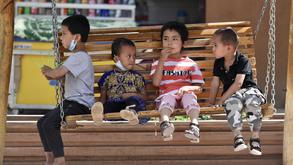 This undated file photo shows children enjoying a day out in Kashgar, Xinjiang Uygur autonomous region. (WEI XIAOHAO / CHINA DAILY)
This undated file photo shows children enjoying a day out in Kashgar, Xinjiang Uygur autonomous region. (WEI XIAOHAO / CHINA DAILY)
BEIJING - Accusations of "suppression of birth rates" and "demographic genocide" in China's Xinjiang Uygur autonomous region are utterly groundless, according to a white paper released on Sunday.
China's State Council Information Office Sunday issued the white paper, titled “Xinjiang Population Dynamics and Data”, detailing the demographic development in Xinjiang.
The accusations of "genocide" in Xinjiang conjured up by the anti-China forces in some countries such as the United States lay bare their hideous double standards, hypocrisy, and hegemonic mindset
The population growth in Xinjiang from 2000 to 2020 was 1.15 percentage points higher than the national average in the compound annual growth rate, the white paper noted.
According to data from the sixth national census conducted in 2010, the population in Xinjiang was 21.82 million, an increase of 3.36 million with a CAGR of 1.68 percent over 2000.
Preliminary data from the seventh national census conducted in 2020 showed that the number increased by 4.04 million to reach 25.85 million with a CAGR of 1.71 percent.
ALSO READ: Forced contraception, sterilization claims in Xinjiang dismissed
Anti-China forces have accused Xinjiang of carrying out "demographic genocide" by forcing birth control on the Uygurs and other ethnic minority groups to suppress their birth rates.
Xinjiang implements its family planning policy in accordance with the law, and forced birth control and pregnancy tests are strictly prohibited, according to the white paper.
It is up to individuals to decide whether or not to use contraceptives and how to use them. No organization or individual may interfere with this freedom.
The accusations of "genocide" in Xinjiang conjured up by the anti-China forces in some countries such as the United States lay bare their hideous double standards, hypocrisy, and hegemonic mindset.
The "genocide" accusations in Xinjiang are devoid of any truth. They are a calumny against China's Xinjiang policy and the successes achieved in developing the region, and a serious violation of international law and the basic principles of international relations, according to the white paper. Posing as "human rights defenders," anti-China forces in some countries such as the United States ignore the dark history of their own countries.
ALSO READ: China slams 'Uygur tribunal' as farce
They also turn a blind eye to the deep-rooted racial discrimination and other systemic problems in their own countries today, and to the stain on human rights spread by their relentless wars in other countries which claim millions of innocent civilian lives.
According to the white paper, the infant mortality rate went down from 26.58 per 1,000 in 2010 to 6.75 per 1,000 in 2020.
The mortality rate for children under five years of age, and maternal mortality rate in the region declined from 31.95 per 1,000, and 43.41 per 100,000 in 2010 to 10.91 per 1,000, and 17.89 per 100,000 in 2020, respectively, it noted.
The demographic development of Xinjiang bears witness to the region's social progress and marks the success of a unified multiethnic country in ensuring the healthy population growth of its ethnic minorities.
Over the past 70 years, Xinjiang has seen rapid and steady population growth, improving population quality, higher life expectancy, and faster urbanization and modernization.
ALSO READ: Women setting their sights higher in Xinjiang
The economic, social and family status of women of all ethnic groups has also continued to improve, according to a white paper.
The improved status has allowed them to have more opportunities to obtain secondary and higher education, and take an active part in economic and social life.
The number and proportion of women in employment have significantly increased. In 2019 for example, 228,100 women joined the workforce in cities and towns across Xinjiang, accounting for 47.43 percent of the total newly employed in urban areas.
The right of ethnic minorities in Xinjiang to learn and use their own languages are effectively protected and their cultures are well preserved.
While carrying out the teaching of standard Chinese, Xinjiang also provides Uygur, Kazak, Kirgiz, Mongolian, Xibe and other language courses at primary and secondary schools.
READ MORE: Xinjiang economy on track for record year
Ethnic minority languages are extensively used in such areas as education, judicature, administration and public affairs, said the white paper.
The claim that Xinjiang's efforts to promote standard Chinese represent a campaign of "cultural genocide" is a false accusation made by anti-China forces, according to the white paper.


